Beijing (People's Daily) – People's Daily published its top 10 international news of 2017 on Friday, as selected by People's Daily and China Radio International editors:
1. Chinese way of thinking becomes global consensus
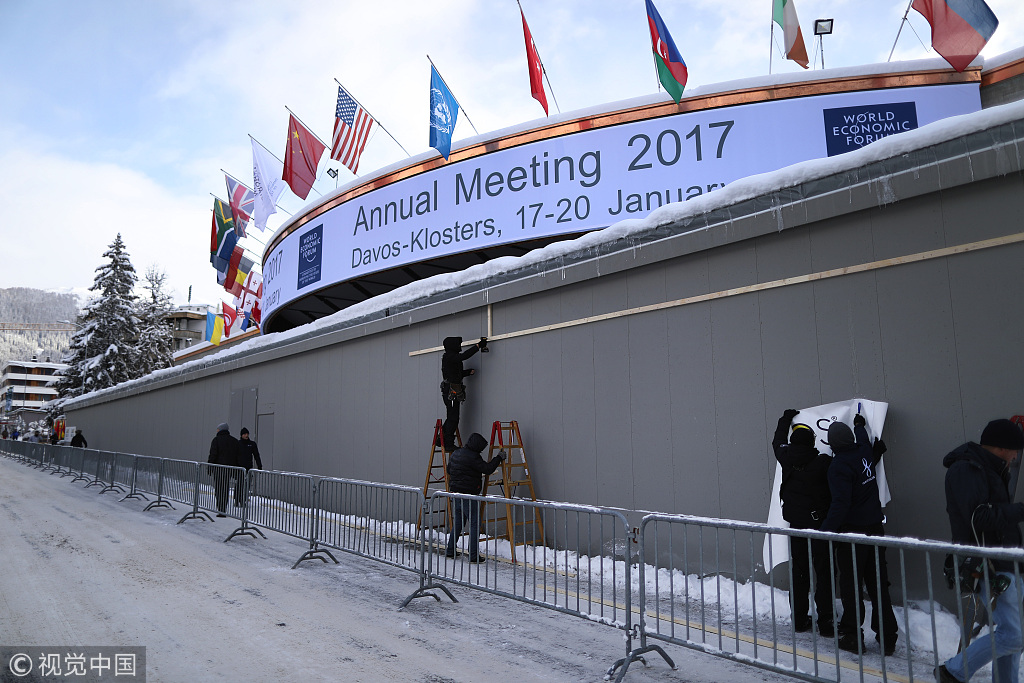
National flags hang above the front of the Congress Center, the venue for the World Economic Forum (WEF) in Davos, Switzerland, on Jan. 15, 2017. World leaders, influential executives, bankers and policy makers attend the 47th annual meeting of the WEF from Jan. 17 - 20. (Photo: VCG)
On January 17, Chinese President Xi Jinping delivered the opening address at the 2017 World Economic Forum in Davos, Switzerland. President Xi stressed the importance of globalization and emphasized the collective efforts needed to create a community of shared destiny for humankind. President Xi’s participation marked the first time a Chinese president had ever attended the summit.
Within weeks of President Xi's opening Davos address, the UN incorporated “a human community with shared destiny” into one of their resolutions. It was the first time a Chinese idea had ever been included in a resolution, acknowledging the principles necessary to achieve shared growth through dialogue and collaboration.
A series of pioneering, leading and institutional achievements were made at the Belt and Road Forum for International Cooperation in Beijing and at the 9th BRICS Summit in Xiamen. China also put forward its concepts and philosophy on global governance. As a result, China's status and influence upon the world stage advanced to greater heights.
2. US withdrawal from the international community reflects unilateral attitudes
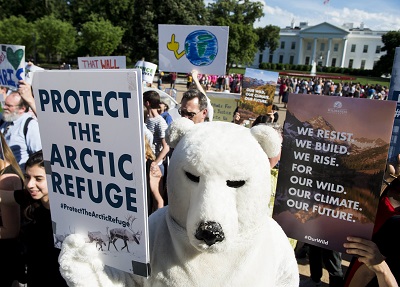
Environmental activists protest in front of the White House after US President Donald Trump announced the US is withdrawing from the Paris climate accord on Thursday, June 1, 2017. (Photo: VCG)
On January 23, the US withdrew from the Trans-Pacific Partnership agreement. The US then exited the Paris climate agreement, the United Nations Educational, Scientific and Cultural Organization and the global compact on migration.
US President Donald Trump's America first initiative showcased an increasing unilateralism and widened his country's divergence from the international community on global issues.
Through its diplomatic withdrawal, the US abandoned its global responsibilities and stoked worldwide uncertainty.
3. Missile tests, joint military drills intensify the Korean Peninsula crisis
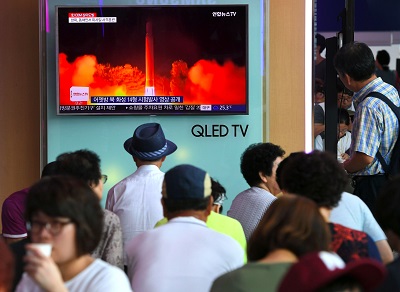
This file photo taken on July 29, 2017 shows people watching a television screen showing a video footage of North Korea's latest test launch of an intercontinental ballistic missile, at a railway station in Seou. (Photo: VCG)
On February 12, North Korea tested a solid-fuel intermediate-range missile. Against opposition from the international community, Pyongyang moved forward with its missile and nuclear weapons program.
The UN Security Council issued sanctions against North Korea while urging the international community to help find a peaceful, diplomatic and political solution.
Meanwhile, the US and South Korea conducted joint military drills, generating further tension.
On December 4, South Korea and US forces staged a joint Air Force military drill, their largest to date and once again increased regional tension.
4. Britain moves closer to Brexit while European integration faces greater challenges

French and European citizens wave France's national flags and Europe's flags to celebrate the defeat of the French far-right party Front National after the second round of the French presidential election in Paris, on May 8, 2017. (Photo: VCG)
On March 29, the UK initiated Brexit by reaching an agreement with the European Union during the first of six rounds of negotiations.
The Netherlands, France, Germany, Austria and other European nations elected new leaders. Even though mainstream parties tried to ease a wave of right-wing populism sweeping Europe, their power was weakened by them. A diversification of societal appeals impacted on European integration.
5. Meetings between Chinese and US leaders receive global attention, contributing to a healthy development of bilateral relations

The Americans look at a poster of "Born in China," which was premiered in the Chinese Embassy in the US on April 24,2017. (Photo: Gao Shi/People's Daily)
On April 6, Chinese President Xi Jinping met US President Donald Trump at the Mar-a-Lago resort in Palm Beach, Florida.
Over the course of the informal summit, leaders from both sides addressed trade, cybersecurity, and cultural dialogue between the two countries. At the end, President Xi invited President Trump to visit China.
The meetings signaled a smooth transition of Sino-US ties. In November, during Trump's visit to China, the two leaders reached a consensus on the development of bilateral relations for the new era.
6.Qatar faces diplomatic crisis, and the Middle East sees increasing turmoil
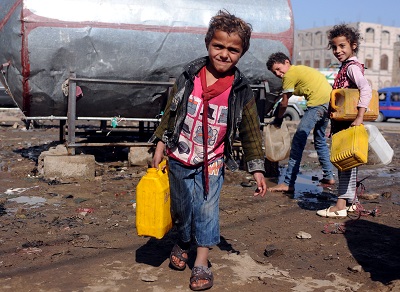
Yemeni children fill their jerry cans with clean water provided by charity organizations on November 27, 2017 in Sana'a, Yemen. (Photo: VCG)
This year the Middle East suffered continuous turmoil. In June, Saudi Arabia and other Islamic countries severed diplomatic relations with Qatar, effectively splitting the Gulf Cooperation Council.
On December 4, former Yemeni President Ali Abdullah Saleh was killed amid fighting between his supporters and former ally, the Houthi rebel movement. Two days later, the US announced its recognition of Jerusalem as Israel's new capital, sparking violent unrest throughout the Middle East. The Israeli-Palestinian peace process now faces even greater challenges.
7. South China Sea tensions soothed as the code of conduct approved

China-ASEAN joint martime rescue drills. (Photo: Xinhua)
At the China-ASEAN Foreign Minister Meeting on August 6, China and the ASEAN nations approved a code of conduct for the South China Sea.
The ASEAN Summit in Manila and on East Asian cooperation in November saw Chinese Premier Li Keqiang announce that China had started dialogue with ASEAN leaders over the code's finer details. China and ASEAN countries recovered and consolidated consensus on resolving disputes among involved countries through dialogue and negotiation while promoting joint-regional regulations of the South China Sea.
8. Financial crisis clears, and global economic growth accelerates
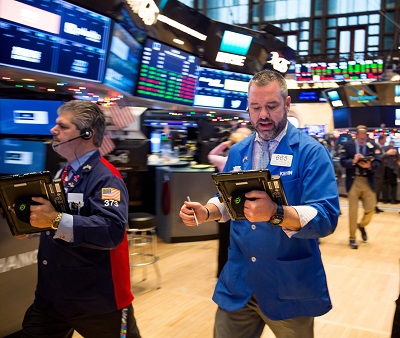
Traders work on the floor of the New York Stock Exchange (NYSE) in New York, US, on Dec. 15, 2017. (Photo: VCG)
The “World Economic Outlook” issued by the International Monetary Fund (IMF) on October 10 raised global economic growth expectations for the coming years. The report noted that 75 percent of the world's economies would advance, reaching a maximum range of acceleration not seen since the 2008 financial crisis.
The UN economy report issued in December pointed out that the global economy for the year ended better than expected.
IMF predictions revealed China's rate of contribution to global economic growth would reach 34.6 percent, making the nation the main pillar of global growth.
9. 19th CPC National Congress offers brilliant approaches for humankind
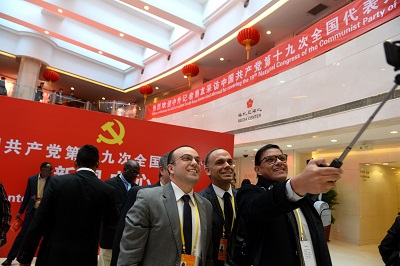
Foreign correspondents take selfies in the media center of the 19th National Congress of the CPC in Beijing. (Photo: VCG)
Beginning on October 18 and stretching six days, the 19th CPC National Congress convened in Beijing, establishing the historical status of Xi Jinping Thought on Socialism with Chinese Characteristics for a New Era, and proposing that Socialism with Chinese Characteristics has now entered a new era.
Fostering a new style of international relations and “building a human community with shared destiny” is the primary aim of international diplomacy with Chinese characteristics. As socialism with Chinese characteristics enters a new era, the continuous development of the Belt and Road Initiative is set to provide a system, featuring Chinese characteristics and broadening the path of international development. For those countries moving forward on the path of modernization, it offers Chinese wisdom and an approach for solving human problems.
10. Islamic State collapses, but anti-terrorism challenges remain severe
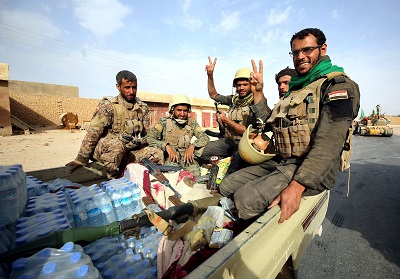
Iraqi forces and members of the Hashed al-Shaabi (Popular Mobilisation units) enter the city of al-Qaim, in Iraq's western Anbar province near the Syrian border as they fight against remnant pockets of Islamic State group jihadists on November 3, 2017. (Photo: VCG)
On November 21, Iraqi Prime Minister Haidar al-Abadi and Iranian President Hassan Rouhani separately announced that extremist groups in Iraq and Syria had been wiped out, and IS had been defeated. Subsequently, Russia also announced their army had finished its anti-terrorism operation in Syria and began to withdraw troops.
But the spillover effect from extremist groups has been witnessed by many countries who have been victims of terror attacks. Right now, the world faces mounting pressure against the spread of terrorism.
(compiled by Lyu Feisha and Yang Chuchu)


